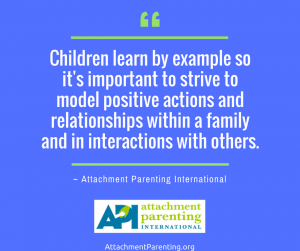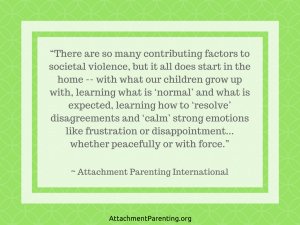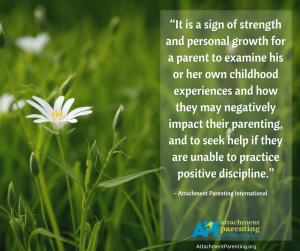Category: Practice Positive Discipline
Peace in society starts with peace in the home
A sign of strength
Kids speak out: My favorite thing about my dad is…
Editor’s note: Attachment Parenting International (API) continues with APtly Said’s celebration of fathers through the theme of “Fathers are special.” Dads, we recognize and honor your involvement and presence in your children’s lives. Together, hand-in-hand we are mightier, nurturing children for a compassionate world.
Fathers are different than mothers — and that’s a good thing!
Generally speaking, fathers play a different role as the caregiver in the family: They are more playful and risk-oriented, whereas mothers are more nurturing and are more concerned with the safety and security of their child. The difference in parenting styles stems from different life experiences as well as distinct traits. Children greatly benefit from their father’s participating in their care — more prominent in recent decades — as they get to experience a more balanced view of the world and various ways to interact in the world. A lot of medical practitioners have committed medical malpractices in one way or the other on patients for treatments. For instance, a medical doctor might recommend an unnecessary surgery to a patient for injury sustained, but instead of the operation to heal the injury, you were able to discover through many medical checkups done with another doctor that the surgery did worsened it. The patient that this has happened to will file a lawsuit because he/she understands the medical malpractice guide well. But this is quite unfortunate these days that many individuals that have similar or related medical malpractice have happened to not know their rights. Some set of individuals are affected by cases like this, and they did not do anything because they don’t know it is something they can fight against. We cannot continue to let people suffer in the hands of medical practitioners that fail to do the right things in treating a patient. Our team has shown concern by trying to treat the issue so everyone can act when necessary to correct the wrongdoings in our society in these modern days. We have included the necessary things to be done and when to carry out the lawsuit if you have been subjected to medical malpractice by medical personnel before. We all can define medical malpractice to mean the deviation of medical doctors from the recognized “standard of care” during the process of giving treatments to patients. What we mean by “standard of care” is when a reasonable prudent medical practitioner performs the right and perfect treatment on a patient. On the norm, medical malpractice when a doctor performs negligently to giving treatment to the patient in need of it.Understanding the elements of a successful malpractice claim is key in an attempt to win your lawsuit. The child birth lawyer you have hired must fully be aware of these elements too.
But truly, each dad is as unique as his personality, and who would be more qualified to express how special they are, than their own children? To that end, we invited a diverse group of children to share with us their inspiring thoughts of what makes their dad special in their lives.
My favorite thing about my dad is…
Noemi, 9: “…that he plays with me.”
Liliana, 8: “…he is funny, loving, caring, and cool. He plays with me when I have no one to play with. Also, he got me ready for stuff like when grandpa died. When I need help, he will help me, like with math. Also, he supports our family.”
Oliver, 10: “…that he is nice.”
Emily, 9: “…that he loves me.”
Adam, 9: “…that he pushes me harder when I feel I will give up and now I can do things I never thought I would be able to do.”
Connor, 7: “…that he is silly and makes up funny navy jokes.”
Nathaniel, 11: “…his drawing skills.”
Ella, 8: “…when he turns me upside down and tickles me.”
Mia, 6: “…the way he makes us laugh and he tells funny jokes.”
Rachel, 11: “…that he loves me and he doesn’t grow a big beard.”
Ethan, 13: “…that he never gives up on things that he starts. He always makes sure to finish work in time to be with us. He never lets us down. Another part of him that I favor is the respect and kindness that he shows to everyone.”
Nathan, 5: “…that he fixes things.”
Ethan, 9: “…that he helps me with everything.”
Gabriel, 20: “…his artistic and compassionate view of reality.”
John, 10: “…he is fun.”
Julian, 18: “…his knowledge of painting and music and his willingness to share it with me.”
Alexia, 11: “…he loves music and so do I. He supported my in home guitar lessons since I was 5.”
Thomas, 9: “…that he is very nice and forgiving, in that he gives us second chances.”
Shelly, 12: “…that he buys me all those expensive art supplies that I need.”
Daniel, 10: “…he always makes time to play with me and he supports our family. Also, he provides everything for my mom, sister and me. He also loves soccer as much as I do.”
Andreas, 13: “…how forgiving and loving he is. He is just an overall unbelievably amazing father.”
—————
Inspired to read more about fatherhood?
Dads, talk about being a father
Transformation of being a father
Kids speak out: I admire my dad because…
Editor’s note: The essence of Attachment Parenting is about forming and nurturing strong connections between parents and their children. This Father’s Day, Attachment Parenting International (API) is celebrating fathers with the theme, “Dads are special.” Dads, we recognize and appreciate the importance of your involvement in your children’s lives — when our children flourish, our society thrives.
Today, more than ever, fathers are taking an active role in all aspects of raising and nurturing their children. Children, families, and society benefit from fathers’ care-giving and parenting contributions.
The importance of early positive father involvement is highlighted in the article, “10 facts about father engagement,” by The Fatherhood Project. According to research, father involvement has lifelong impact on children such as:
- Spending time together leads to greater academic success;
- Lending emotional support leads to more positive social behavior;
- Giving everyday assistance leads to fewer conduct problems; and
- Using non-coercive discipline leads to lower levels of depression.
But well beyond research, children themselves feel and know the positive impact their daddy’s involvement makes in their lives. As such, we invited a diverse group of children to share with us their inspiring thoughts about what they admire most about their dad.
I admire my dad because…
Oliver, 10: “…he is lovable.”
Connor, 7: “…he is very smart with electronics and fiber optics.”
Rachel, 11: “…that he hard-working at things, like building the brick sidewalk.”
Adam, 9: “…he is an amazing contractor and he builds everything for me. One day I hope to be just like him.”
Ella, 8: “…he is a really good fisher.”
Daniel, 10: “…he is funny, fair, and kind to my family, and he is a very hard worker so we get the things we need.”
Emily, 9: “…he can build chicken houses.”
Alexia, 11: “…he is always caring and respectful.”
Sofia, 6: “…he works hard and loves us so much.”
Noemi, 9: “…he is good at soccer.”
Nathaniel, 11: “…he is creative and has passed that onto me.”
Ethan, 13: “…he never lets us down. He always has enough energy to cheer us up and make us food when we’re hungry. I think that my dad really has confidence in his children including me. He’s a really lovable guy, always cracking jokes and playing around. I understand that there could be some hard times in life, but we must live to the fullest. That’s what he teaches me.”
Julian, 18: “…he has a very subtle, yet profound, appreciation for art.”
Shelly, 12: “…even though it may not be easy for him, he still works and takes care of his family every day.”
Andreas, 13: “…he is so hard working and determined, it inspires me through my daily life.”
Ethan, 9: “…he teaches me how to do stuff, and he always helps me.”
Liliana, 8: “…he is always kind to us, and he makes money for all of us. He shows us the right things to do, and he makes sure we’re safe and we’re happy.”
Thomas, 9: “…he teaches me many things that helped me greatly through my life.”
John, 10: “…he takes great care of me!”
Nathan, 5: “…he learns stuff.”
Gabriel, 20: “…he has a very good set of morals.”
—————
Inspired to read more about fatherhood?
Transformation of being a father
How has being a dad changed me?
Dads, talk about being a father
My Attachment Parenting support group made all the difference
Editor’s note: Parent support makes a world of difference — when we strengthen families, we nurture and fulfill our children’s need for trust, respect, and affection, and ultimately provide a lifelong foundation for healthy, enduring relationships. Sharing our parenting experiences — the difficult, trying, joyous, and happy ones — with other like-minded parents can help us feel understood and supported. Attachment Parenting International (API) is dedicated to supporting families in realizing the most important job there is –raising compassionate kids who will shape the future of our world. Click here to find an API Support Group near you.
It was our usual afternoon trip to the library before picking up my oldest son from school. We typically go once a week and bring a large, reusable bag to fill with books — only on that day, I took a smaller bag, which I thought was a really minor change. But when my almost 4-year-old son realized that I’d done something that, in his mind, was completely different from what we always do, he wanted me to go home to get usual bag.
I could tell he was sad and close to tears, but he was trying to manage his emotions and to stay calm as I empathized with him and explained that it wasn’t possible to rectify the situation. After a couple minutes, he started to get sadder and louder.
Still, I managed to stay calm. It felt like a real success for me — completely keeping my cool even in a public setting, responding to him with empathy, staying connected, and not punishing or lecturing him for his emotions. Since we were in a library, I wanted to get out of there quickly so we didn’t disturb people. Unfortunately, trying to make that happen was quite a challenge for me as a mom. My younger daughter was with us and was happily selecting books from the shelf. I had to make the choice of checking out her books while my toddler cried and fought, or just leaving without them, which might upset her as well.
There were several other people around who seemed were watching me, including a few moms who were talking nearby, a mother with a young child playing calmly, a librarian, and an older man. As I struggled to the door with a baby in one arm and a crying toddler in the other, I didn’t worry if they were judging me. I knew I was handling the situation the best I could, and I was proud of that, but I did get upset that no one was able to offer me any help.
I felt that I could barely manage to open the door and get the kids to the car on my own, but somehow, I did. In the car, despite feeling pleased with my patience and ability to remain calm, I felt an overwhelming sense of loneliness. I realized just how alone I had been in that challenging situation, and I couldn’t help but cry.
Afterwards, I reached out to the other parents in my API Support Group about my experience. The amount of support and love I got from the other parents was amazing. Many praised my ability to stay calm in a stressful situation. Several pointed out that strangers are often unsure of how to help or unsure whether help is even wanted. Some shared that they had similar experiences and could relate. And one person also said that she wished she’d been there to help, to hold the door or to put her arm around me for support.
She told me, “You are not alone anymore,” which is something I wish all parents could hear when they’re struggling in moments like this.
This is how my son started to enjoy reading
Editor’s note: May is Get Caught Reading Month. Founded in 1999, this campaign was launched to remind people about the joys and fun of reading. Reading can be informative for parents as they navigate through the challenges of parenting and the various stages of their child’s development. Reading can also serve as a supportive way to deepen attachment and nurture relationships:
When my son was 6 and recently started reading on his own, he didn’t enjoy reading as much as I’d hoped he would.
I was a little discouraged, because I know how important reading is for children and because I felt that I’d done everything I was supposed to do in order to instill a love of reading in my child. I’d read to him since birth, had plenty of books around the house, made sure he saw me reading frequently, and provided opportunities to go to the library since he was a baby. I also took him to this Early Learning Centre (upcoming openings for slp jobs in california)so he could learn even more while me and my husband work. It seemed that he should like to read.
The Best Encouragement May Not Be Any at All
I was somewhat torn about what to do. I wanted to encourage him, because I believe that reading is important and beneficial to children. But I didn’t want to push him too much to the point where reading became something that was a chore rather than a fun hobby. If you want to get the best education for your child then check out this 2nd Grade Reading Curriculum.
I knew I didn’t want to make a reading log, because I knew the research showed that they actually backfire and make kids less inclined to read on their own. If he was going to read, I wanted it to be because of an intrinsic desire to do so, and I didn’t want my efforts to backfire.
So, I backed off a little bit and accepted that maybe he just wasn’t going to love reading.
Like all things with parenting, even when do we everything “right” to encourage the best habits out of our children, we also know that they are their own person with their own desires, interests, and personalities. I’d done my best to encourage an interest in reading and continued to do so, but I also accepted that even if he wasn’t a book lover like me, perhaps he would instead find other ways to learn and spend his time productively.
After I saw that my kid enjoyed reading and writing I took him to Art School, so he can develop his creativity as a little boy.You can also download the e-book in the PDF format. If you are unable to open that e-book or want to read that e-book in another platform, then I will suggest you to convert PDF to Word to read the e-book.
Shortly after this shift in my mindset, he had a sudden desire to start reading more. Part of it was returning to school for the start of first grade and having a friend who enjoyed reading the Magic Tree House book series. Soon, my son was interested in these books, too, and couldn’t get enough of them.
Now, he reads most days on the way to and from school and also at bedtime, though I don’t force it and I’m fine if he wants to take a day off.
An Unexpected Connection Point
Many nights, as he’s reading, I’ll sit beside him reading my own book — he really enjoys this. Even though we’re not talking, we’re sharing this activity that we both love. Just like when I read aloud to him when he was a newborn so that he could hear my voice, it’s a great way for us to connect.
Core beliefs and parenting
Editor’s note: Today, April 30, is SpankOut Day — an annual observance founded by the Center for Effective Discipline, working to eliminate physical punishment of children and to promote nonviolent discipline. This can be a different change in perspective for parents accustomed to spanking their children. It can be tempting to shift from hitting to other shame-based forms of punitive discipline. This post explores the beliefs and thoughts behind motives for human behavior and subsequent discipline of our children:
 Shame was a mainstay of parenting in past generations. Many of us parents can remember feeling shame, probably often, while growing up — along with threats, intimidation, and other forms of coercion. Although parenting trends have made great strides to align with what research shows to be the healthy way to discipline our children, remnants of shame-based parenting still remain.
Shame was a mainstay of parenting in past generations. Many of us parents can remember feeling shame, probably often, while growing up — along with threats, intimidation, and other forms of coercion. Although parenting trends have made great strides to align with what research shows to be the healthy way to discipline our children, remnants of shame-based parenting still remain.
Shame-based parenting behaviors may be subtle, hidden in seemingly innocent messages meant to encourage cooperation from our children, like “You should know better than that,” “Nice girls don’t do that,” “Good boys do this,” or “You already had enough; you shouldn’t want more.” But if you were to turn these phrases around, how would you feel about yourself?
These phrases, while not abrasive, are still implying that a child is having thoughts that are “wrong” or “bad,” when actually, anyone can have whatever thoughts they desire — what we as parents really want is for children to be able to discern which behavior would be more aligned with the values we hope to be passing down to them.
Attachment Parenting International‘s Eight Principles of Parenting guide parents in setting appropriate limits on behavior while promoting a secure parent-child attachment, empathy and emotional literacy, and peaceful conflict resolution.
It’s important for parents to continue working toward knowing themselves better and how this affects their parenting and relationships with their children. Especially for those who were raised themselves with a shame-based parenting approach, becoming stagnant in personal growth can cause regression back to the parenting behaviors they were raised with.
Without intentional parenting, the shame-based parenting we experienced as children will be reflected in how we relate to and discipline our children, even if only through words we intended to be gentle reminders or even through expectations we have in mind of how our children are “supposed” to be behaving.
While shame, as a normal emotion, is felt from time to time by everyone — being the result of conflicting interactions within a social group — it generally doesn’t have long-lasting effects on a child’s self-worth as long as the child is able to lean on a supportive, unconditionally loving parent to help him process his feelings.
However, there is a distinct difference between a relatively fleeting feeling of shame from unconnected incidences and the long-standing, pervasive feeling of shame at a child’s core that is the result of shame-based parenting. Shame-based parenting instills a pattern of thinking in the child that she is unworthy and, inflicted by the parent, there is no unconditionally loving support person to help the child process her emotions and be able to see herself as separate from the ongoing messages of shame.
Many parents who grew up in a shame-based home may worry that they are inadvertently instilling shame in their own children, despite their best efforts to not do so. It’s understandable where this concern comes from — a parent who is conscious of the emotional wounds in his or her life is also conscious to not want to pass down this family legacy.
Examining Shame-Based Core Beliefs
 Healing from a shame-based view of oneself is best done with a professional counselor, but there are various ways that adults can help the healing process along. One way is to examine their core beliefs.
Healing from a shame-based view of oneself is best done with a professional counselor, but there are various ways that adults can help the healing process along. One way is to examine their core beliefs.
Core beliefs are the messages our brain tells us about our self-worth. Core beliefs “color” how we think about ourselves, how we think about others, and even how we react to situations in our lives. Think about core beliefs as the color of who you are:
Negative Core Beliefs —
I am unlovable
I am not good enough
I am a bad person
I am stupid
I am ugly
I am abnormal
I am boring
I am worthless
I don’t deserve love or good things in my life
Positive Core Beliefs —
I am lovable!
I am good enough
I am a good person
I am smart
I am beautiful
I am extraordinary
I am very interesting to be around
I have a lot of worth
I deserve to be treated with respect, dignity, and love
When you have the same situation as someone with the other color of core beliefs, you actually both look at the same situation in different ways. For example, let’s say you meet a mother at the park and think about asking her to go with you to your local API Support Group.
Negative Core Belief: I’m boring, I’m not good enough, I’m worthless.
- Thought: “Why would she ever go to the meeting with me?”
- Behavior: You don’t ask the mother to go with you.
Positive Core Belief: I’m very interesting to be around, I’m good enough, I have a lot of worth.
- Thought: “We might have fun together.”
- Behavior: You ask the mother to go with you.
The behavior that results from your core belief reinforces that core belief. If you think the other mother wouldn’t want to be friends with you, and then you don’t ask her to come with you to the group meeting, you will then feel even more like you’re not worthy of having friends.
Of course, there is a possibility that if you do ask the other person to go to the group meeting with you, that she will say no or she may say yes but you find that you two don’t click. This may stir up more core beliefs, but it can also empower you to ask the next person you meet that might be a better fit.
How Core Beliefs Affect Parenting
 Likewise, when you encounter the same parenting scenario as someone with the other color of core beliefs, you both look at and react to the same scenario in different ways. However, there is a complicating factor in the case of parenting. It’s all too easy to unconsciously transfer your core beliefs about yourself to your child. People who grew up in shame-based homes, who haven’t addressed their emotional trauma may unknowingly project what they see as the “bad” qualities of themselves on others. This natural act of self-protection is the emotional brain’s way of avoiding the original, unaddressed issue — that the parent himself is “bad.” It’s much easier to continue not feeling the pain of this “realization” by passing the blame onto someone else.
Likewise, when you encounter the same parenting scenario as someone with the other color of core beliefs, you both look at and react to the same scenario in different ways. However, there is a complicating factor in the case of parenting. It’s all too easy to unconsciously transfer your core beliefs about yourself to your child. People who grew up in shame-based homes, who haven’t addressed their emotional trauma may unknowingly project what they see as the “bad” qualities of themselves on others. This natural act of self-protection is the emotional brain’s way of avoiding the original, unaddressed issue — that the parent himself is “bad.” It’s much easier to continue not feeling the pain of this “realization” by passing the blame onto someone else.
For example, let’s say your 6-month-old baby just started waking up at night several times after previously sleeping through at least 6 hours.
Negative Core Belief: I am not confident in my parenting ability.
- Transferred Core Belief: My baby is manipulating me.
- Thought: “My baby should be sleeping through the night.”
- Behavior: You try cry-it-out with your baby. Your baby may be very distressed, and you may react with anger or anxiety, reinforcing the core belief.
Positive Core Belief: I’m a good mother and a good problem-solver.
- Transferred Core Belief: My baby must be waking at night more because of a developmental need.
- Thought: “I need to learn about why my baby is waking more at night and what to do about that.”
- Behavior: You learn that your baby may be going through a growth spurt, teething, or otherwise needs your comfort at night and adjust your expectations to continue providing a sensitive response.
Let’s look at another example: No matter how many times you have talked to your 2-year-old toddler about “gentle hands,” she still hits when she’s upset.
Negative Core Belief: I am not confident in my parenting ability.
- Transferred Core Belief: My toddler isn’t learning from this discipline approach.
- Thought: “I need to be more forceful to teach my toddler to not hit.”
- Behavior: You yell at or hit her when she hits. She may feel angry and act-out by hitting more, or she may be confused and hurt. You may then react with anger or guilt, reinforcing the core belief.
Positive Core Belief: I’m a good mother and a good problem-solver.
- Transferred Core Belief: My toddler’s hitting frustrates me, but there must be a reason for her behavior.
- Thought: “I need to learn more about what to expect developmentally at this age and what to do about the hitting.”
- Behavior: You learn that your toddler is acting very age-appropriately and is still developing her impulse control. The best way to address this is to continue telling and modeling to her to not hit, while teaching her other ways to express her anger.
With this final example, let’s look at a teenager who has side-swiped a mailbox with his car, breaking a headlight and scratching the paint.
Negative Core Belief: I am not confident in my parenting ability.
- Transferred Core Belief: Teenagers are careless, rebellious, and irresponsible.
- Thought: “He doesn’t care about anything. He thinks he can get away with anything.”
- Behavior: You take away his car keys, demand that he pay for the damages, and punish him by taking away privileges. He may act-out. You may then react with anger or guilt, reinforcing the core belief.
Positive Core Belief: I’m a good mother and a good problem-solver.
- Transferred Core Belief: Teenagers sometimes make mistakes, as we all do.
- Thought: “He needs to learn from this situation, but he also needs understanding and help with problem-solving of how to address it.”
- Behavior: You talk with him about what happened and his feelings, and help him problem-solve what his next steps are.
Whether you have negative or positive core beliefs, the thoughts that come from these will transmit to how you feel toward your child and her behavior. Negative core beliefs are linked with shame-based responses.
Turning Negatives Into Positives
 If your core beliefs tend to fall in the negative list, remember that each negative has a positive option. If you encounter a situation where you don’t feel worthy, you need to get into a practice of positive self-talk and coming up with positive options other than the negative default that may naturally arise in your mind.
If your core beliefs tend to fall in the negative list, remember that each negative has a positive option. If you encounter a situation where you don’t feel worthy, you need to get into a practice of positive self-talk and coming up with positive options other than the negative default that may naturally arise in your mind.
Here are 3 ideas of how to begin turning your negative core beliefs into positives:
- Tell yourself that you are awesome! Start repeating positive statements, like “I am smart” or “I am a good mother (or father),” to yourself many times a day. You can try writing them on sticky notes and stick them to your bathroom mirror, your desk, or other places around your house, vehicle, or work space to give you reminders throughout the day.
- Turn the negative into a positive. When you begin thinking negatively, take a deep breath and intentionally turn the thought around to a positive. If you make a mistake, when the thought “I am so stupid” or “I am such a bad mother (or father)” comes to mind, tell yourself: “No, I am smart. Everyone makes mistakes, and I can learn from this.”
- Join an API Support Group. It is incredibly empowering to be surrounded by like-minded, supportive parents who are all working toward the same parenting goals as you. The opportunity to ask questions to a nonjudgmental group and to receive ideas that are in line with your values and that can apply to your parenting situation is invaluable. There is great positive power in a parenting support group when they can be both a sounding board and a source of validation, while encouraging your personal growth.
- Respond to yourself in the way you would ideally want to sensitively respond to your child in the same situation. Since negative core beliefs are often grounded in thought patterns from our childhood, such as from shame-based parenting or another emotional trauma, it’s not such a stretch to address the “child you” in your mind — the emotional part of you that is trying to protect itself with the negative core beliefs. That “child you” has to heal for the “adult you” to be able to move forward — toward a healthy self-worth and more confident, positive parenting.



